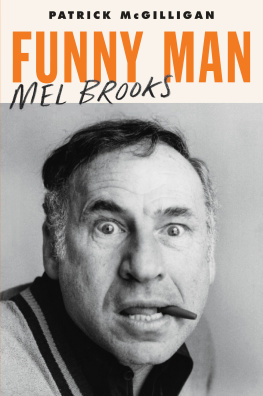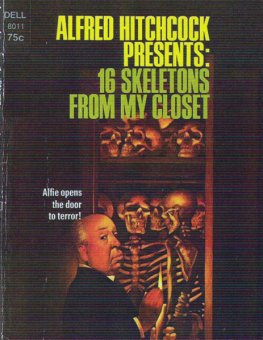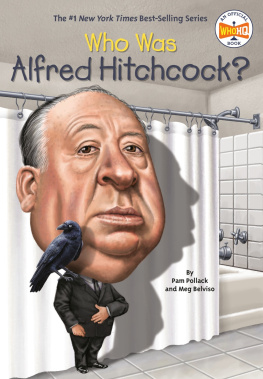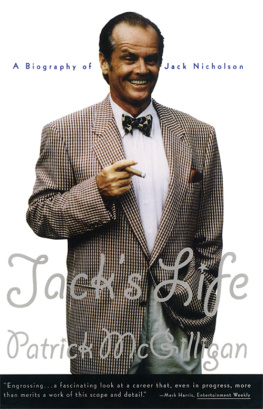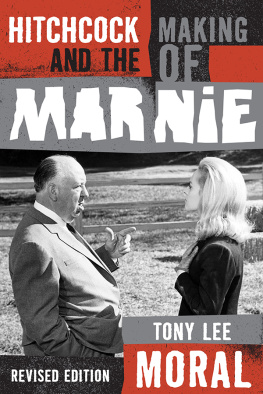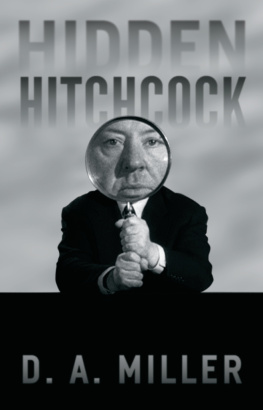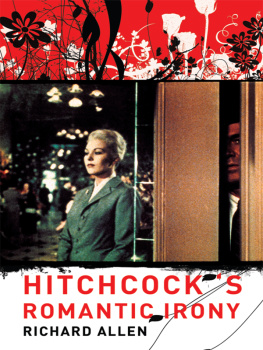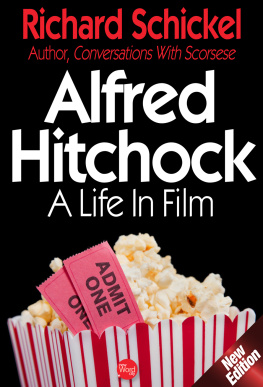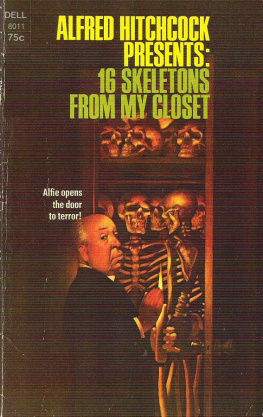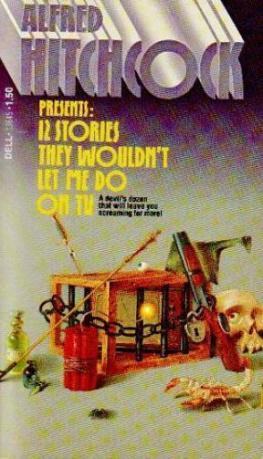Patrick McGilligan - Alfred Hitchcock: A Life in Darkness and Light
Here you can read online Patrick McGilligan - Alfred Hitchcock: A Life in Darkness and Light full text of the book (entire story) in english for free. Download pdf and epub, get meaning, cover and reviews about this ebook. year: 2003, publisher: HarperCollins, genre: Non-fiction. Description of the work, (preface) as well as reviews are available. Best literature library LitArk.com created for fans of good reading and offers a wide selection of genres:
Romance novel
Science fiction
Adventure
Detective
Science
History
Home and family
Prose
Art
Politics
Computer
Non-fiction
Religion
Business
Children
Humor
Choose a favorite category and find really read worthwhile books. Enjoy immersion in the world of imagination, feel the emotions of the characters or learn something new for yourself, make an fascinating discovery.

- Book:Alfred Hitchcock: A Life in Darkness and Light
- Author:
- Publisher:HarperCollins
- Genre:
- Year:2003
- Rating:4 / 5
- Favourites:Add to favourites
- Your mark:
- 80
- 1
- 2
- 3
- 4
- 5
Alfred Hitchcock: A Life in Darkness and Light: summary, description and annotation
We offer to read an annotation, description, summary or preface (depends on what the author of the book "Alfred Hitchcock: A Life in Darkness and Light" wrote himself). If you haven't found the necessary information about the book — write in the comments, we will try to find it.
Alfred Hitchcock: A Life in Darkness and Light — read online for free the complete book (whole text) full work
Below is the text of the book, divided by pages. System saving the place of the last page read, allows you to conveniently read the book "Alfred Hitchcock: A Life in Darkness and Light" online for free, without having to search again every time where you left off. Put a bookmark, and you can go to the page where you finished reading at any time.
Font size:
Interval:
Bookmark:
PATRICK McGILLIGAN
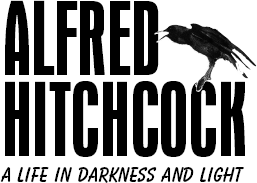

FOR TINA
WHEN ONE OF HIS FRENCH FOLLOWERS
SOLEMNLY ASKED ABOUT THE DEEPEST LOGIC OF
HIS FILMS, THE MASTER SHRUGGED, TO PUT
THE AUDIENCE THROUGH IT.
The Man Behind the Body,
Holiday, September 1964
18991913
He might saw a woman in half, as one of his favorite real-life murderers did. Or, with a wave of his wand, scare a swarm of birds out from under his English gentlemans hat.
All of his tricks were in a single trunk plastered with travel stickershis life, as it were. There were umbrellas, door keys, tiepins, rings and bracelets, a glass of poison, a ticking bomb, long kitchen knives and a host of other glittering stuff. Sometimes it seemed that he juggled only a handful of items with endless hypnotic variation. But just when you thought hed shown you all he had, he reached into the deep bottom of the trunk and found something there to mesmerize you afresh.
Alfred Joseph Hitchcock was the ultimate magician of the cinema, an illusionist as pleased by his own mastery as he was by his audiences reactions. He perfected a mask of jovial sangfroid, but he couldnt have been happier when the audience collectively sighed, laughed, screamedor wet their seats.
His name was as English as trifle. The Alfred stood in honor of his fathers brother. The Joseph was a nod to the Irish Catholicism of his motherthe name of the carpenter of Nazareth and husband of Mary.
The Hitch was a derivative of Richard, Coeur de Lion, most popular of the Angevin kings. Richard was popular throughout the kingdom in variants, among them Dick, Rick, and Hick; the initial R was commonly nicked into H. The Cock meant little or son of, as in son of Richard, or son of Hitch.
Little Hitch.
He shortened the name for friends and introductions. Its Hitch, he drawled, relishing the trap about to be sprung, without the cock. As he made a game of identity in his wrong-man movies, Alfred Hitchcock made a game of his identity in life.
Few directors forged their careers as resolutely, as self-consciously, as Alfred Joseph Hitchcock. Starting from boyhood, he was drawn slowly but steadily toward his mtierjust as steadily as his family moved along East End suburbs, down the river Lea, in the last years of the nineteenth century, toward the greater opportunity of central London.
Leytonstone, where Alfred Joseph Hitchcock was born, was north of the Thames and south of beautiful Epping Forest, where Tennyson lived when he wrote Locksley Hall. A hamlet attached to Leyton (Lea Town), Leytonstone (Leytons Town) was once the fiefdom of rich merchants who built grand houses on estates that bordered country meadows and marshlands. Eventually the rich moved away, abandoning their mansions and estates to make way for vast numbers of cheap houses built by greedy developers for the nineteenth-century explosion of city workers. By the turn of the twentieth, the area was thriving commercially, booming with shops, churches, and schools, and fast losing its rural character. The population of Leytonstone doubled twice after the 1861 census.
Like Stratford, where Hitchcocks father, William, was born, and West Ham, home of his mother, Emma Jane Whelan, Leytonstone was part of the outer London county of Essex. The Essex boomtowns owed their existence largely to the Great Eastern Railway Line, which offered cheap workmens fares to central London (about six miles from the Leyton station), and proximity to the river Lea. Down the Lea a tremendous variety of agricultural goods traveled through a series of locks leading to Regents Canal, en route to the docks and warehouses of the Thames. The Hitchcocks owed their livelihood to the worker boom, the railway, the boats, and the river Lea.
William Hitchcock was born in 1862 to Joseph Hitchcock, a master greengrocer in Stratford. Part of West Ham, Stratford was separated from Bow in Middlesex by the Lea, over which stretched the Bow Bridge, the first stone bridge built in England. Joseph Hitchcock was already among the second generation of Hitchcocks to thrive in greengrocering. Besides William, Joseph Hitchcock had at least six other sons and daughters: Mary (known as Polly), Charlie, Alfred, Ellen, Emma, and John.
Polly, the eldest, married a man named Howe, and bore two children. Charles, the eldest son, fathered five, including Teresa and Mary, Hitchcocks cherished older cousins, whom he treated as aunts. Charless son John, a Catholic priest, was known to all as Father John; he served as head of the parish of Our Lady and St. Thomas of Canterbury in Harrow, from 1929 to 1944, and is remembered there for doubling the size of the church and erecting a modern school.
Of the directors namesake, Williams brother Alfred, not much is known, except that he was a bulwark of the family business. Alfred was to run a fish shop on busy Tower Bridge Road, immediately south of the Thames, and spearhead the London side of operations.
Ellen married a man from Cork and died giving birth to their third child. Her husband became legendary in the family as the first relation to emigrate to America, while the daughter who survived Ellens death, also named Ellen, briefly moved in with the Leytonstone branch when the future director was a young boy.
Through shipping and intermarriage the Hitchcocks were well aware of the wider world, especially outposts of the United Kingdom. When she was just twenty years old, Emma left in 1899 for South Africa to marry James Arthur Rhodes. Taken off the boat in Durban harbor in a large wicker basket (like the kind that figures into the climax of Torn Curtain), Emma was then carried to safe ground on the backs of Zulu warriors. Like other Hitchcocks, Aunt Emma was a devout Catholic; she attended Mass for much of her life via rickshaw. The longest-lived and the farthest-flung, intrepid Aunt Emma became a favorite of young Alfred Hitchcock.
The baby of the original brood, John Fitzpatrick, had a pair of devilish eyes that twinkled in an angelic face. The burgeoning family fortune bought him education at the Douai School for Boys in Woolhampton; the priests who administered the school hoped that John might take the vows. Not to be: a financial wizard, John returned to the greengrocery trade to buy a string of stores near open street markets, which he turned into fish shops, often fronted by pavement stalls. These shops were then linked into a fish-greengrocery combine called John Hitchcock Ltd. Uncle John was married to a well-educated linguist who had taught English in France and Germany. Though childless, they doted on their nieces and nephews.
The circumstances of Alfred Hitchcocks childhood have been portrayed elsewhere as Dickensian, but the truth was closer to a vision of Frank Capra. Hard, hard work was necessary, expected and valued, but work was rewarded. The Hitchcocks were a jolly clan, full of fun. Uncle John could be coaxed into elaborate charades; he loved to play tricks on people. The Hitchcock women were characters, some of them known to swear like troopers; the directors spinster aunts in particular inspired a multitude of Plainspoken Janes in Hitchcock films. The family adored gossip and scandal, risqu stories, Cockney humor. They attended sporting events, music hall, concerts, plays, and, in time, moving pictures. They enjoyed parties where everyone drank too much and then got up to sing the sheet-music hits or the light operas of Gilbert and Sullivan.
Next pageFont size:
Interval:
Bookmark:
Similar books «Alfred Hitchcock: A Life in Darkness and Light»
Look at similar books to Alfred Hitchcock: A Life in Darkness and Light. We have selected literature similar in name and meaning in the hope of providing readers with more options to find new, interesting, not yet read works.
Discussion, reviews of the book Alfred Hitchcock: A Life in Darkness and Light and just readers' own opinions. Leave your comments, write what you think about the work, its meaning or the main characters. Specify what exactly you liked and what you didn't like, and why you think so.

